Peugeot 308 vs Toyota RAV4 – Which one offers the better deal?
Costs and Efficiency:
When it comes to price and running costs, the biggest differences usually appear. This is often where you see which car fits your budget better in the long run.
Peugeot 308 has a evident advantage in terms of price – it starts at 29200 £, while the Toyota RAV4 costs 35100 £. That’s a price difference of around 5897 £.
Fuel consumption also shows a difference: Toyota RAV4 manages with 1 L and is therefore significantly more efficient than the Peugeot 308 with 2.30 L. The difference is about 1.30 L per 100 km.
As for range, the Peugeot 308 performs clearly better – achieving up to 450 km, about 375 km more than the Toyota RAV4.
Engine and Performance:
Under the bonnet, it becomes clear which model is tuned for sportiness and which one takes the lead when you hit the accelerator.
When it comes to engine power, the Toyota RAV4 has a clearly perceptible edge – offering 306 HP compared to 195 HP. That’s roughly 111 HP more horsepower.
In acceleration from 0 to 100 km/h, the Toyota RAV4 is evident quicker – completing the sprint in 6 s, while the Peugeot 308 takes 7.60 s. That’s about 1.60 s faster.
In terms of top speed, the Peugeot 308 performs slightly better – reaching 225 km/h, while the Toyota RAV4 tops out at 180 km/h. The difference is around 45 km/h.
Space and Everyday Use:
Whether family car or daily driver – which one offers more room, flexibility and comfort?
Both vehicles offer seating for 5 people.
In curb weight, Peugeot 308 is clearly perceptible lighter – 1453 kg compared to 1745 kg. The difference is around 292 kg.
In terms of boot space, the Toyota RAV4 offers noticeable more room – 580 L compared to 412 L. That’s a difference of about 168 L.
In maximum load capacity, the Toyota RAV4 performs evident better – up to 1690 L, which is about 367 L more than the Peugeot 308.
When it comes to payload, Toyota RAV4 somewhat takes the win – 600 kg compared to 503 kg. That’s a difference of about 97 kg.
Who comes out on top?
Overall, the Toyota RAV4 shows itself to be dominates this comparison and secures the title of DriveDuel Champion.
It convinces with the more balanced overall package and proves to be the more versatile choice for everyday use.
Costs and Consumption
View detailed analysis
Engine and Performance
View detailed analysis
Dimensions and Body
View detailed analysis
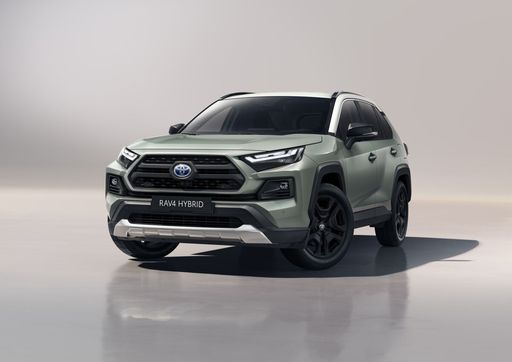 @ Toyota Motor Corporation
@ Toyota Motor Corporation
Toyota RAV4
Peugeot 308
The Peugeot 308 brings a sleek, feline profile and an unexpectedly upscale cabin, with clever packaging and materials that feel a touch more premium than you might expect. It’s composed on the road, easy to live with for daily life, and a smart choice if you want a stylish hatch that still behaves when the road gets interesting.
details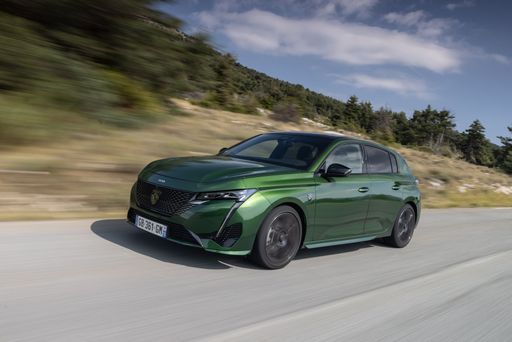 @ Peugeot / Stellantis Media
@ Peugeot / Stellantis Media
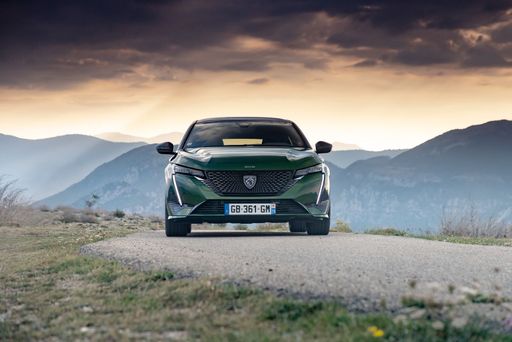 @ Peugeot / Stellantis Media
@ Peugeot / Stellantis Media
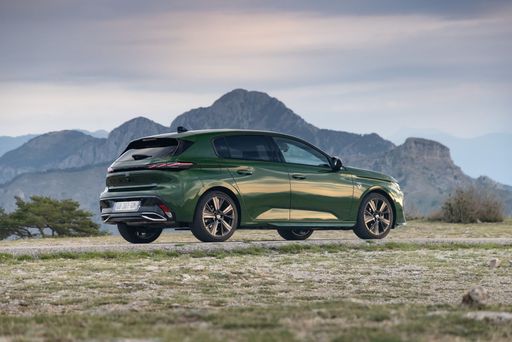 @ Peugeot / Stellantis Media
@ Peugeot / Stellantis Media
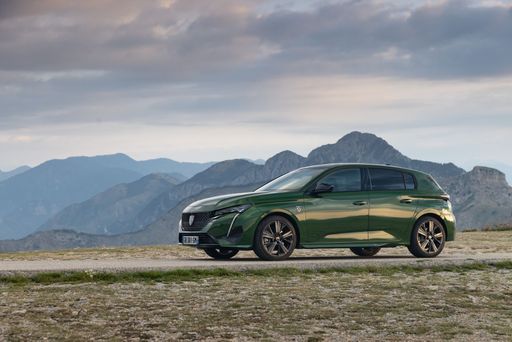 @ Peugeot / Stellantis Media
@ Peugeot / Stellantis Media
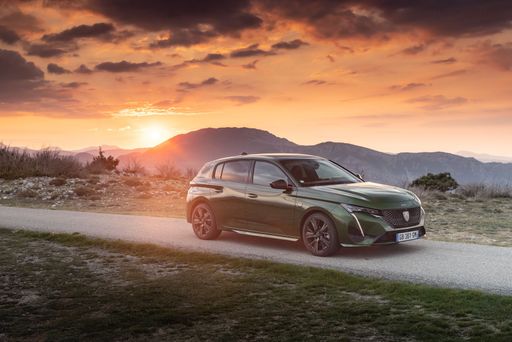 @ Peugeot / Stellantis Media
@ Peugeot / Stellantis Media
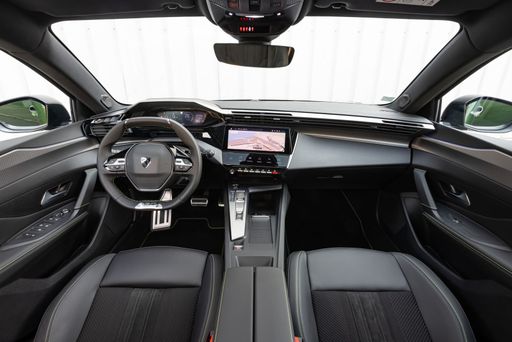 @ Peugeot / Stellantis Media
@ Peugeot / Stellantis Media
Toyota RAV4
The Toyota RAV4 feels like a sensible friend on the road, marrying dependable practicality with a dash of SUV personality that keeps daily driving from turning dull. Comfortable and easy to live with, it looks tough without shouting and quietly gets the job done — a sensible pick for buyers who want versatility without drama.
details @ Toyota Motor Corporation
@ Toyota Motor Corporation
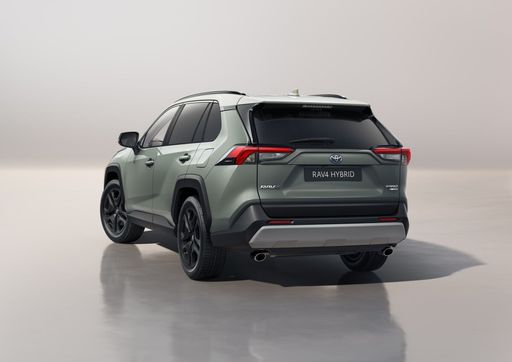 @ Toyota Motor Corporation
@ Toyota Motor Corporation
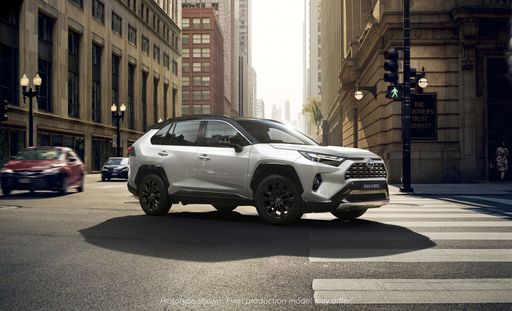 @ Toyota Motor Corporation
@ Toyota Motor Corporation
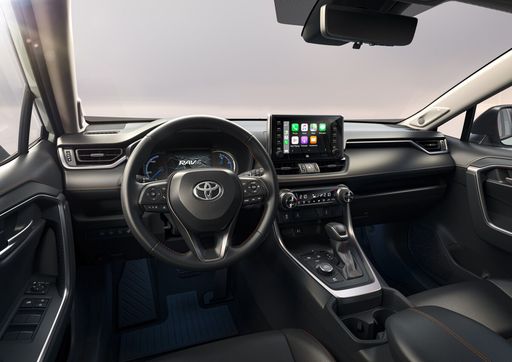 @ Toyota Motor Corporation
@ Toyota Motor Corporation
 @ Peugeot / Stellantis Media
@ Peugeot / Stellantis Media
|
 @ Toyota Motor Corporation
@ Toyota Motor Corporation
|
|
|
|
Costs and Consumption |
|
|---|---|
|
Price
29200 - 42600 £
|
Price
35100 - 55700 £
|
|
Consumption L/100km
2.3 - 5 L
|
Consumption L/100km
1 - 5.6 L
|
|
Consumption kWh/100km
15.60 kWh
|
Consumption kWh/100km
-
|
|
Electric Range
78 - 450 km
|
Electric Range
75 km
|
|
Battery Capacity
0.40 kWh
|
Battery Capacity
-
|
|
co2
0 - 129 g/km
|
co2
22 - 128 g/km
|
|
Fuel tank capacity
42 - 52 L
|
Fuel tank capacity
55 L
|
Dimensions and Body |
|
|---|---|
|
Body Type
Hatchback
|
Body Type
SUV
|
|
Seats
5
|
Seats
5
|
|
Doors
5
|
Doors
5
|
|
Curb weight
1453 - 1749 kg
|
Curb weight
1745 - 1910 kg
|
|
Trunk capacity
314 - 412 L
|
Trunk capacity
520 - 580 L
|
|
Length
4367 mm
|
Length
4600 mm
|
|
Width
1852 mm
|
Width
1855 mm
|
|
Height
1438 mm
|
Height
1685 mm
|
|
Max trunk capacity
1258 - 1323 L
|
Max trunk capacity
1604 - 1690 L
|
|
Payload
430 - 503 kg
|
Payload
390 - 600 kg
|
Engine and Performance |
|
|---|---|
|
Engine Type
Petrol MHEV, Diesel, Plugin Hybrid, Electric
|
Engine Type
Full Hybrid, Plugin Hybrid
|
|
Transmission
Automatic
|
Transmission
Automatic
|
|
Transmission Detail
Dual-Clutch Automatic, Automatic Gearbox, Reduction Gearbox
|
Transmission Detail
CVT
|
|
Drive Type
Front-Wheel Drive
|
Drive Type
Front-Wheel Drive, All-Wheel Drive
|
|
Power HP
131 - 195 HP
|
Power HP
218 - 306 HP
|
|
Acceleration 0-100km/h
7.6 - 10.6 s
|
Acceleration 0-100km/h
6 - 8.4 s
|
|
Max Speed
170 - 225 km/h
|
Max Speed
180 km/h
|
|
Torque
230 - 300 Nm
|
Torque
-
|
|
Number of Cylinders
3 - 4
|
Number of Cylinders
4
|
|
Power kW
96 - 144 kW
|
Power kW
160 - 225 kW
|
|
Engine capacity
1199 - 1598 cm3
|
Engine capacity
2487 cm3
|
General |
|
|---|---|
|
Model Year
2025
|
Model Year
2024 - 2025
|
|
CO2 Efficiency Class
C, D, B, A
|
CO2 Efficiency Class
D, B
|
|
Brand
Peugeot
|
Brand
Toyota
|
Is the Peugeot 308 offered with different drivetrains?
Available configurations include Front-Wheel Drive.
The prices and data displayed are estimates based on German list prices and may vary by country. This information is not legally binding.
